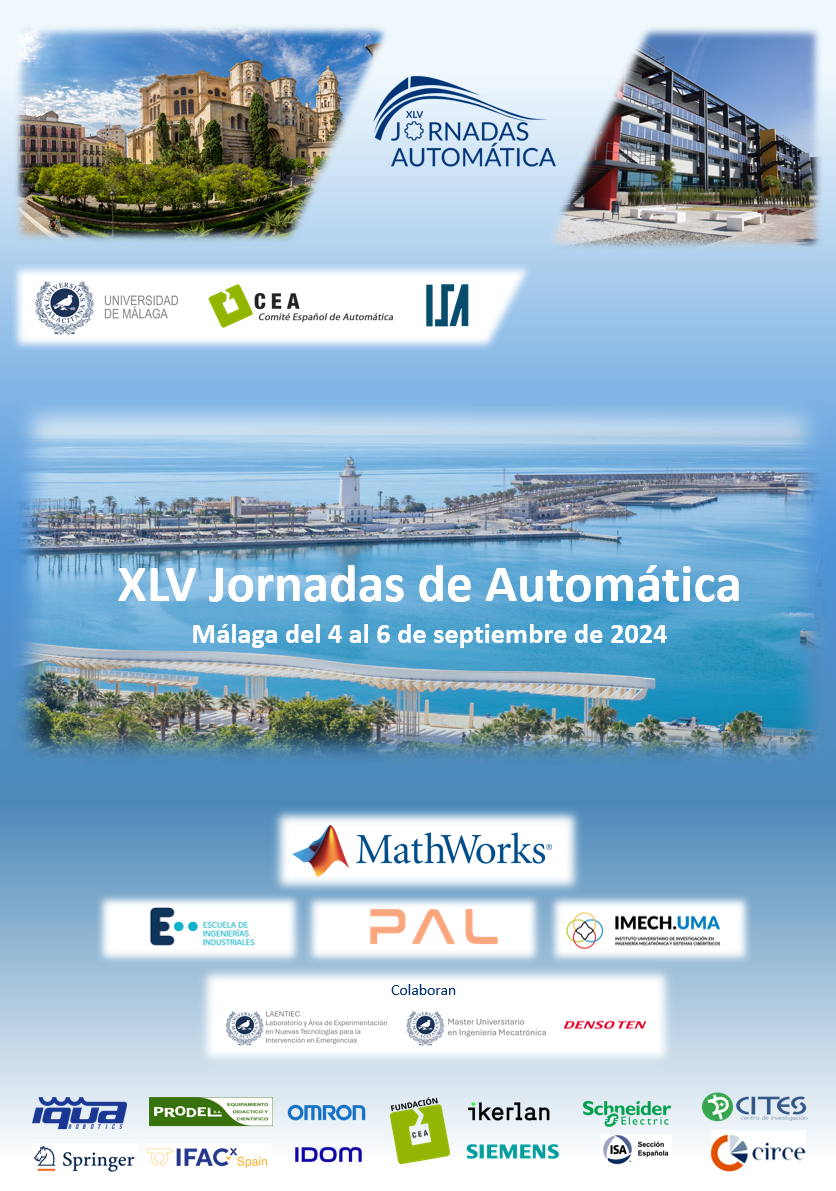Sistema de aprendizaje cooperativo para enjambre de robots sociales
DOI:
https://doi.org/10.17979/ja-cea.2024.45.10865Palabras clave:
Sistemas autónomos, Interacción multi-modal, Aprendizaje por Refuerzo, Coaprendizaje, AutoaprendizajeResumen
Cada vez son más los robots sociales dedicados a asistencia diaria en casas particulares y residencias, por lo que una adaptación al usuario y centralizar la información recogida por todos ellos resulta fundamental. Este artículo presenta un sistema de aprendizaje cooperativo para el robot social Mini. Este robot pretende asistir a usuarios de edad avanzada facilitando tareas mediante una interacción humano-robot adaptada a sus necesidades. El sistema propuesto permite integrar distintos métodos de aprendizaje por refuerzo de forma simultánea, permitiendo a los robots mejorar su comportamiento y aprender en entornos dinámicos de forma autónoma. Este sistema pretende superar limitaciones importantes del aprendizaje en robótica social al conectar los robots a un servidor central. La red permite compartir y centralizar la información de las interacciones de cada robot, agilizando el proceso de aprendizaje al disponer de un mayor volumen de datos en menos tiempo. El servidor almacena y procesa la información, mejorando la eficiencia y reduciendo la carga computacional en los robots. Este sistema permite a los robots adaptarse mejor a diferentes usuarios y entornos, mejorando sus respuestas y la personalización en la interacción humano-robot.
Referencias
Akalin, N., Loutfi, A., 2021. Reinforcement learning approaches in social robotics. Sensors 21 (4), 1292.
Franc ̧ois-Lavet, V., Henderson, P., Islam, R., Bellemare, M. G., Pineau, J., et al., 2018. An introduction to deep reinforcement learning. Foundations and Trends® in Machine Learning 11 (3-4), 219–354.
Gamboa-Montero, J. J., Alonso-Martin, F., Marques-Villarroya, S., Sequeira, J., Salichs, M. A., 2023. Asynchronous federated learning system for human–robot touch interaction. Expert Systems with Applications 211, 118510.
Goodfellow, I., Bengio, Y., Courville, A., 2016. Deep learning. MIT press.
Hessel, M., Modayil, J., Van Hasselt, H., Schaul, T., Ostrovski, G., Dabney, W., Horgan, D., Piot, B., Azar, M., Silver, D., 2018. Rainbow: Combining improvements in deep reinforcement learning. Proceedings of the AAAI conference on artificial intelligence 32 (1), 14.
Li, L., Fan, Y., Tse, M., Lin, K.-Y., 2020. A review of applications in federated learning. Computers & Industrial Engineering 149, 106854.
Liu, Y., Li, Z., Liu, H., Kan, Z., 2020. Skill transfer learning for autonomous robots and human–robot cooperation: A survey. Robotics and Autonomous Systems 128, 103515.
Maroto-G ́omez, M., Castro-Gonz ́alez, ́A., Castillo, J. C., Malfaz, M., Salichs, M. ́A., 2023. An adaptive decision-making system supported on user preference predictions for human–robot interactive communication. User Modeling and User-Adapted Interaction 33 (2), 359–403.
Maroto-G ́omez, M., Malfaz, M., Castillo, J. C., Castro-Gonz ́alez, ́A., Salichs, M. ́A., 2024. Personalizing activity selection in assistive social robots from explicit and implicit user feedback. International Journal of Social Robotics, 1–19.
Quigley, M., Conley, K., Gerkey, B., Faust, J., Foote, T., Leibs, J., Wheeler, R., Ng, A. Y., et al., 2009. Ros: an open-source robot operating system. ICRA workshop on open source software 3 (2), 5.
Salichs, M. A., Castro-Gonz ́alez, ́A., Salichs, E., Fern ́andez-Rodicio, E., Maroto-G ́omez, M., Gamboa-Montero, J. J., Marques-Villarroya, S., Castillo, J. C., Alonso-Mart ́ın, F., Malfaz, M., 2020. Mini: a new social robot for the elderly. International Journal of Social Robotics 12 (6), 1231–1249.
Smith, L., Lamprecht, C., 2024. Identifying the limitations associated with machine learning techniques in performing accounting tasks. Journal of Financial Reporting and Accounting.
Soori, M., Arezoo, B., Dastres, R., 2023. Artificial intelligence, machine learning and deep learning in advanced robotics, a review. Cognitive Robotics. Sutton, R. S., Barto, A. G., 2018. Reinforcement learning: An introduction. MIT press.
Vouloutsi, V., Cominelli, L., Dogar, M., Lepora, N., Zito, C., Martinez-Hernandez, U., 2023. Towards living machines: current and future trends of tactile sensing, grasping, and social robotics. Bioinspiration & biomimetics 18 (2), 025002.
Descargas
Publicado
Número
Sección
Licencia
Derechos de autor 2024 Sofía Álvarez-Arias, Marcos Maroto-Gómez, Sara Carrasco-Martínez, María Malfaz, Miguel Ángel Salichs

Esta obra está bajo una licencia internacional Creative Commons Atribución-NoComercial-CompartirIgual 4.0.





